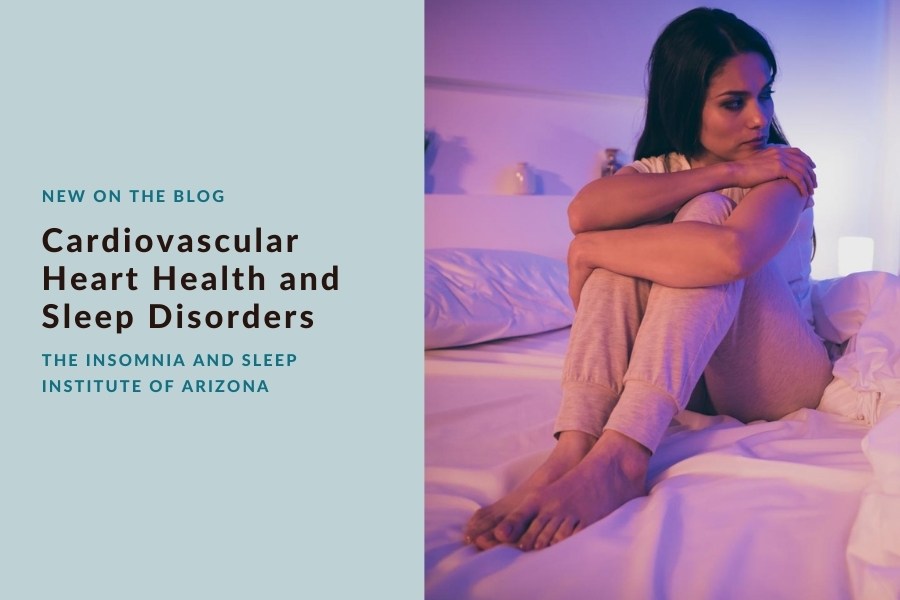When it comes to sleep disorders, it’s important to get to the “heart” of the matter. That’s why every consultation at The Insomnia and Sleep Institute of Arizona is with a sleep specialist capable of diagnosing sleep disorders. Cardiovascular heart health has long been linked to sleep disorders (and quality of sleep, or lack thereof, overall), but the American Heart Association just released a Presidential Advisory in which sleep has been added to the “cardiovascular checklist.” It has been a long time coming, but makes great strides in spreading the word about the importance of sleep for heart health.
The latest checklist, Life’s Essential 8, includes “healthy sleep” and calls it “essential for optimal cardiovascular health.” There are other lifestyle items on the list, with the previous seven being highlighted for quite some time. They include exposure to nicotine, diet, blood glucose, blood pressure, physical activity, cholesterol levels, and weight. According to the AHA, between 7 – 9 hours of sleep per night is advised for the best heart health in adults, and more hours for children. That is in keeping with general guidelines by sleep experts, though it is important to keep in mind that everyone has unique sleep needs and they change as we age.
Healthy Sleep, Healthy Heart
This new scoring is recommended for those aged two and older, and the primary components of the checklist are also measured in an updated way. There are new guidelines for diet and “nicotine exposure” (such as adding vaping to the list as well as secondhand smoke). You can find the online tool at My Life Check, which features a score that each person can strive toward that totals 100. More details on the new checklist can be found in Circulation, the AHA’s peer-reviewed journal
For many years now, cardiovascular disease has been the leading cause of death both in the United States and around the world. The AHA’s 2022 Heart Disease and Stroke Statistics Update estimates that 121.5 million people in the U.S. have high blood pressure while 100 million are obese and over 28 million have Type-2 diabetes. However, Type-2 diabetes is notoriously underdiagnosed, so the figure is probably much higher (and even more are “pre-diabetic”). Additionally, only 25 percent of adults in the country self-report meeting the baseline exercise recommendations as set forth by the Department of Health and Human Services “Physical Activity Guidelines for Americans.” Numerous studies have shown that in the last 20 years, over 80 percent of cardiovascular events “may have been prevented by healthy lifestyle and management of known cardiovascular risk factors”—including proper sleep.
According to the AHA president, the Association’s latest metric for sleep duration is based on the latest research. Specifically, “sleep impacts overall health, and people who have healthier sleep patterns manage health factors such as weight, blood pressure or risk for Type-2 diabetes more effectively.” The AHA also points out that cutting-edge means of measuring sleep, such as various wearable devices, are giving people more means of gauging their own sleep and sleep habits. This has pros and cons, since it can be a great tool to help inform people but may not be wholly accurate. It is important to see a sleep specialist even if you suspect poor sleep (such as feeling fatigued in the daytime when you don’t think you should).
Sleep and You
It has been 12 years since the AHA last updated its metric. In that time, over 2,400 related research papers have been published, and there have been new findings on brain/heart health as it relates to cardiovascular health. AHA is committed to keeping pace with such findings, which is how sleep quality got included. As the research and science community begins to better understand all factors that inform heart health, updates will likely continue to unfold.
Do you struggle with poor sleep, or do you suspect your child does? Regular quality sleep is essential for everyone. The first step in understanding your sleep quality and any sleep disorders that may be present is via a consultation with a sleep expert. No referral is needed at The Insomnia and Sleep Institute. Simply give us a call or complete the online contact form.





